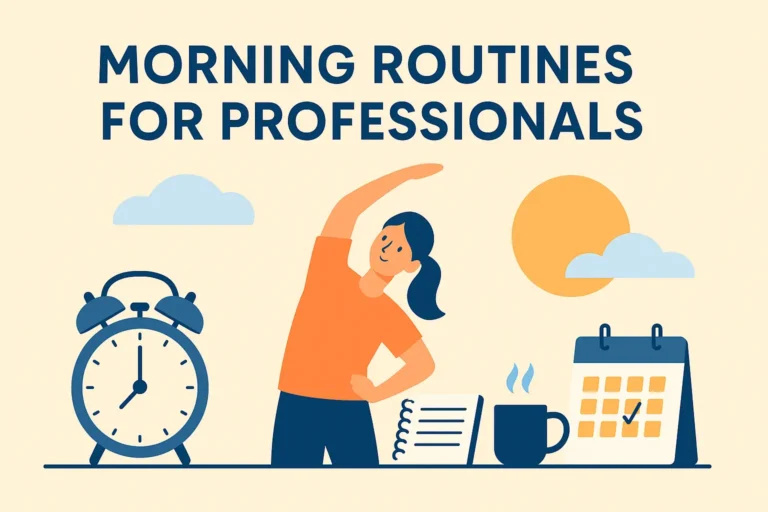Good Excuses to Call Out of Work That Actually Work
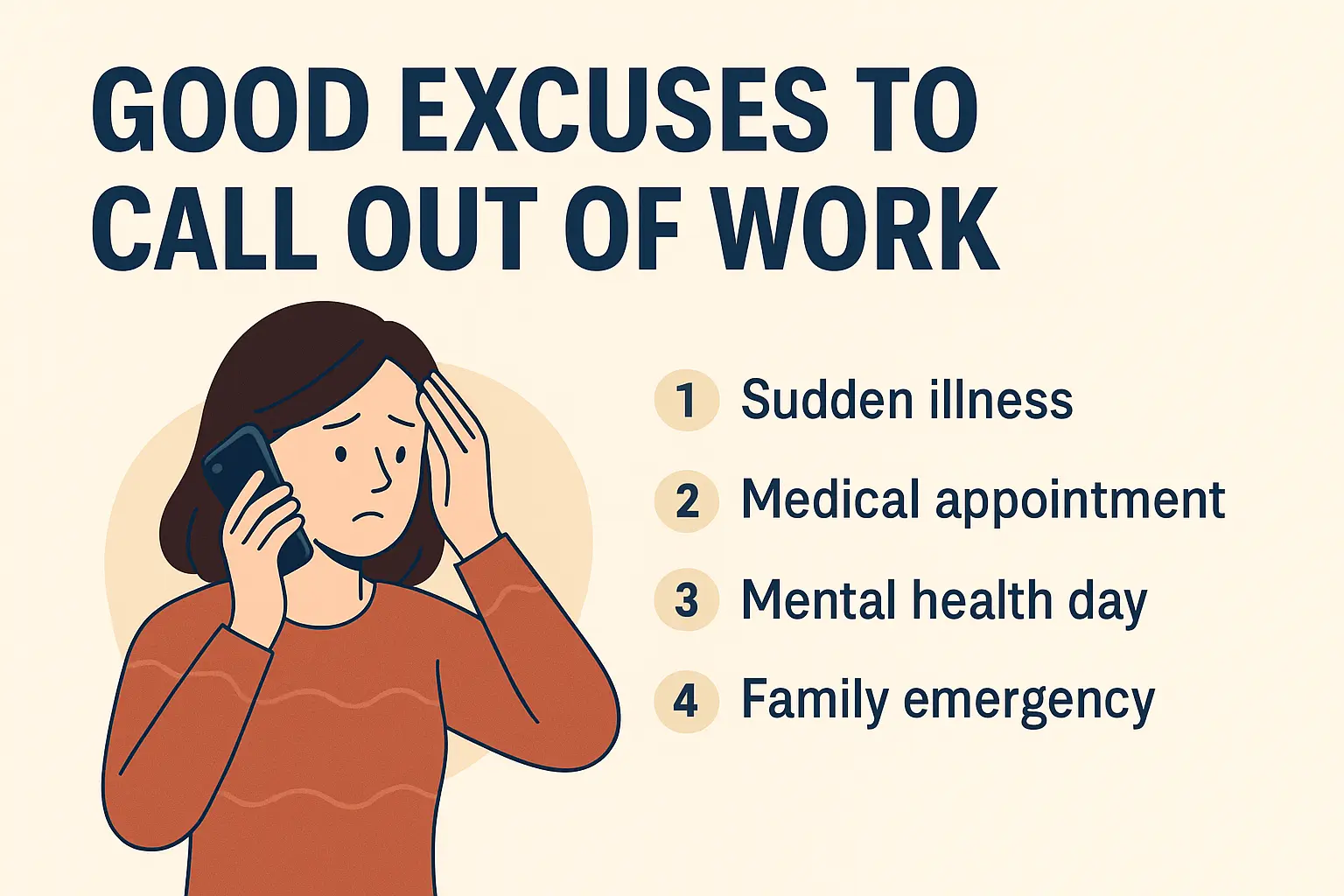
Good excuses to call out of work aren’t about tricking anyone—they’re about communicating clearly when life demands attention outside the office. Everyone needs a break sometimes, but not all reasons carry the same weight at work. Some make sense right away, while others may raise doubts or seem careless. The way you explain things—and what you choose to say—can either keep you in good standing or put your reliability under a question mark.
A solid excuse is one that your manager understands without much back-and-forth. It’s respectful of their time, honest enough to maintain trust, and still gives you the room you need to take care of yourself or your responsibilities. It also shows that you’re not taking advantage of the system, which helps you maintain a strong reputation at work.
Let’s break down what actually works—what you can say that makes sense, feels real, and still keeps your position secure.
|
Excuse |
Accepted By Employers? |
Advance Notice Needed? |
Risk of Doubt? |
|---|---|---|---|
|
Illness |
Yes |
Not always |
Low |
|
Doctor’s Appointment |
Yes |
Preferred |
Low |
|
Mental Health Day |
Often |
Optional |
Medium |
|
Family Emergency |
Yes |
No |
Low |
|
Car Trouble |
Yes |
No |
Medium |
|
Home Emergency |
Yes |
No |
Low |
|
Childcare Problems |
Yes |
No |
Low |
|
Religious Observance |
Yes |
Preferred |
Very Low |
|
Bereavement |
Yes |
No |
Very Low |
|
Pet Emergency |
Sometimes |
No |
Medium |
What Makes a “Good” Excuse for Missing Work
A good excuse is one your boss doesn’t second-guess. It comes across as reasonable, direct, and honest without going into too many personal details. At the same time, it’s not so vague that it sounds made up.
For example, saying you’re not feeling well is much better than something vague like “I’m not up for it today.” The first shows a valid reason and respects the workplace. The second might leave someone wondering if you’re serious or just not in the mood.
The best excuses have these three things in common:
- They’re believable. Something that can realistically happen to anyone.
- They’re relevant. The reason actually makes sense as something that would keep you from working.
- They’re respectful. You’re still considering your team and job responsibilities, even if you can’t be there.
Avoid dramatic stories or anything that sounds rehearsed. Keep it simple and straightforward.
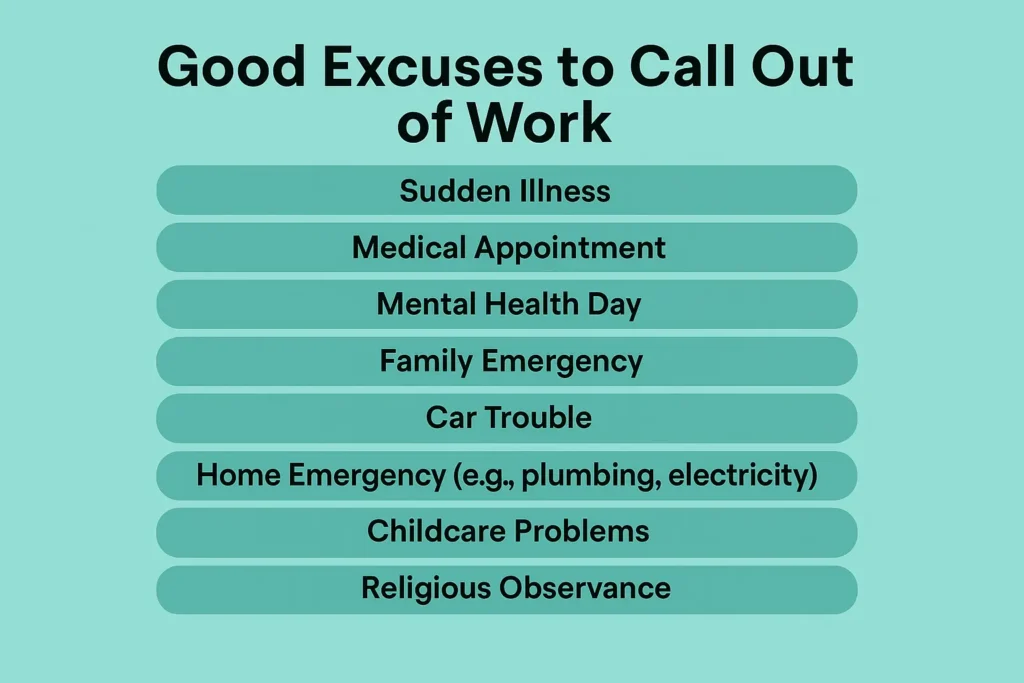
Most Accepted Good Excuses to Call Out of Work
Some reasons just make sense. They happen to people often, they’re understandable, and they don’t usually raise questions. When you go with one of these, your manager is far more likely to accept your absence without any issue.
Here are a few that are commonly accepted:
- You’ve come down with something contagious
- You have a doctor’s visit that couldn’t be rescheduled
- Your mental health needs a reset
- A family member needs urgent help
- Something broke down at home and needs your attention
- There’s an unexpected issue with your kids or their school
Now let’s break down the first three a bit more.
1. Sudden Illness
Calling out due to sickness is one of the most straightforward reasons, and for good reason—it protects your coworkers too. Even something as basic as a fever or bad cold is enough to justify staying home. Nobody wants you coughing all over the place or pushing through when you clearly need rest.
Still, how you say it matters. Instead of sharing every detail, a simple note like, “I’ve woken up feeling pretty unwell this morning, and I don’t think I can make it in” works fine. It shows respect for others’ health while keeping your dignity intact. No need to overshare.
2. Medical Appointment
Some appointments can’t wait. Whether it’s a specialist you booked months ago or a last-minute check-up that popped up after a concern, medical visits are a perfectly valid reason to take the day off or adjust your hours.
Be clear and concise. Something like: “I have a medical appointment I couldn’t move—just wanted to let you know I’ll need to take the morning off.” That’s it. Most employers won’t dig any deeper, especially if you don’t make a habit of missing time for the same thing over and over.
3. Mental Health Day
This one’s gaining more acceptance—and it should. Mental burnout is real, and pretending to be fine when your mind needs rest only makes things worse. You don’t have to label it as “mental health” if that feels too personal. Just saying, “I need to take a personal day today, feeling off and not in the right headspace to work effectively,” works just as well.
Taking one day to recharge your mind can help prevent longer absences in the future. You’re doing your job and your health a favor by recognizing when you’ve hit that wall.
4. Family Emergency
Life doesn’t check your work schedule before throwing a curveball. A sudden issue with a parent, spouse, or child often requires immediate attention. This kind of excuse usually gets understood fast—because chances are, your manager has been there too.
When explaining it, there’s no need for heavy detail. You might say, “There’s a family emergency I have to take care of today. I’ll be away from work and will check in as soon as I’m able.” That’s enough. Keep it respectful, clear, and move fast. Emergencies don’t come with a script.
10 Signs It’s Time to Retire

5. Car Trouble
Your vehicle breaking down on a workday morning isn’t exactly rare—and it’s frustrating. Maybe the engine won’t start, or you get a flat tire halfway to the office. It’s something bosses hear about often, so it doesn’t usually need a long explanation.
Just avoid dramatic stories. A quick message like, “My car wouldn’t start this morning, and I’m arranging a fix now. I won’t be able to make it in today,” keeps things simple. No one expects you to teleport, and this kind of hiccup is usually easy to understand.
6. Home Emergency (e.g., plumbing, electricity)
There’s no ideal time for a pipe to burst or the power to shut off. These issues force your hand. You can’t focus on work when your bathroom is flooding or your fridge just died along with the power.
In this case, a short note is enough. You could say, “There’s a serious plumbing issue at home that I have to deal with right away. I’ll need the day to sort it out.” Home emergencies are usually unpredictable—and most managers won’t expect you to work while your ceiling leaks.
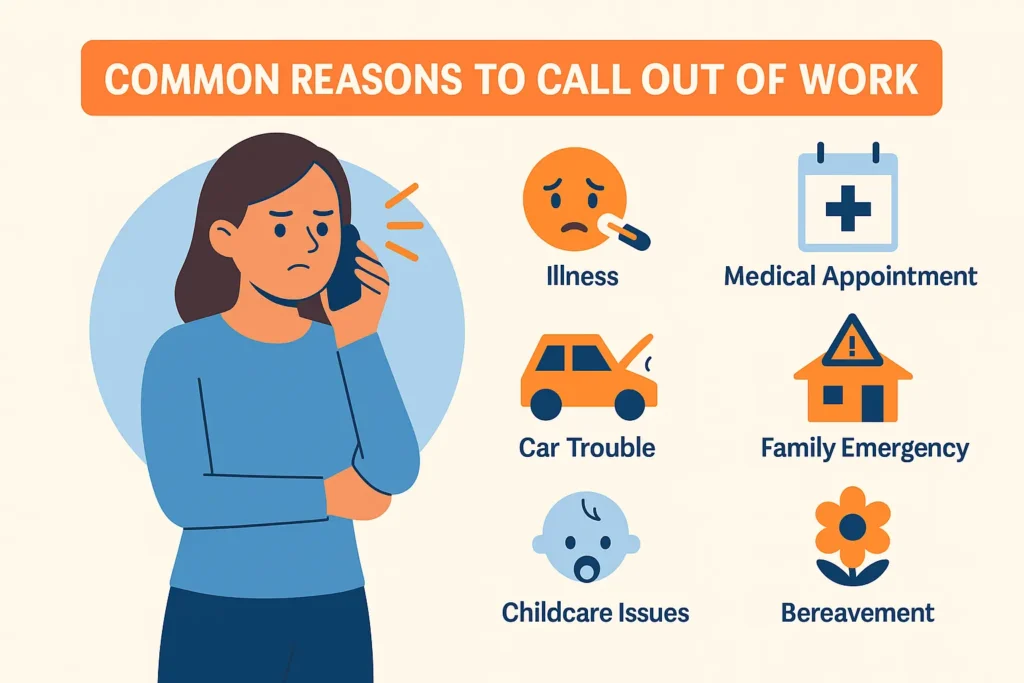
7. Childcare Problems
Kids don’t run on your work schedule. Sometimes the babysitter cancels last minute, school shuts down early, or your child falls sick overnight. When that happens, you’re the backup plan—and that’s okay.
You can explain this by saying something like, “My childcare arrangements fell through, and I need to stay home with my child today.” This kind of situation is common, and employers usually respond with understanding. It helps to let them know you’ll be back on track the next day.
8. Religious Observance
Everyone has the right to observe their faith. Certain religious days are non-negotiable for many people, even if they aren’t public holidays. These occasions may require time away from work to pray, fast, or attend ceremonies.
There’s no need to overexplain. A simple message like, “I’ll be off today due to a religious commitment,” communicates everything you need. Being upfront and respectful makes it clear this isn’t just a personal day—it’s meaningful to you.
9. Bereavement
Losing someone is heavy. When a close friend or family member passes away, you need space—emotionally and practically. There may be travel, funerals, or just the need to grieve quietly. No manager should expect you to be productive in that state.
Let them know with honesty: “There’s been a death in my family, and I’ll need to take time off to handle arrangements and grieve.” Most companies have bereavement leave policies in place, and many offer extra time if needed.
Professional Ways to Use These Excuses
Even the most reasonable excuse can fall flat if it’s delivered poorly. How you communicate matters just as much as what you’re saying. A casual tone, bad timing, or too many vague details can make a legitimate reason seem suspicious. On the flip side, a short, respectful message goes a long way in keeping your manager on your side.
Using a good excuse the right way shows that you respect the team, even when you can’t be there. It’s about being honest, clear, and staying within your company’s usual policies. The goal isn’t just to stay out of trouble—it’s to keep your work relationships steady, even during unexpected time off.
Who to Call or Message
When something comes up and you need to miss work, your first thought should be: who do I tell?
In most workplaces, that’s your direct manager or supervisor. They’re the one responsible for managing the team’s schedule, so it’s their call to shift things around. Some companies have a formal process (like an HR email or call line), but even then, a quick personal message to your manager is a smart move.
If you’re unsure, check your employee handbook—or just go with the person who usually handles schedule changes. Don’t tell a coworker and hope they’ll pass it along. That’s how miscommunication starts.
What to Say and What Not to Say
Here’s the trick: say enough to be clear but not so much that you sound like you’re trying too hard. Simple is best.
✅ Say this:
“I’m not feeling well this morning and won’t be able to work today.”
“There’s been a family issue that I need to handle urgently.”
“I have a medical appointment and will be unavailable until the afternoon.”
❌ Don’t say this:
“I just woke up feeling weird but maybe I’ll be okay later.”
“There’s kind of a thing going on with my cousin’s neighbor’s plumbing…”
“I didn’t sleep great last night so I’ll probably just stay home.”
Too much detail sounds like rambling. Not enough detail, and it sounds fake. Find the middle. Keep your tone neutral, not defensive. And unless asked, you don’t need to explain your whole situation.
Timing and Notice Tips
The earlier, the better. Managers don’t like being caught off guard, especially during busy hours. A quick morning message before your shift gives them time to make adjustments. If your shift starts at 9, don’t wait until 8:59.
Emergencies can’t always be predicted, but many situations (like appointments or religious days) can be shared in advance. If you know you’ll be out next Thursday, let your team know now—not Wednesday night.
Bonus tip: If you’re working remotely, it’s even more important to notify them directly. Just being offline isn’t enough. A one-line message helps avoid confusion and shows you’re still acting responsibly.
Statistical Insight
According to the U.S. Bureau of Labor Statistics, the average number of employee sick days taken per year is 4.4 days across private industry workers.
Bad Excuses That Can Get You in Trouble
There are a few excuses that nearly always raise red flags. These ones tend to sound too vague, too dramatic, or too often repeated—and once your manager starts doubting you, it’s hard to get that trust back.
Here are a few examples of what not to use:
- “I forgot I had a shift today.”
- “My alarm didn’t go off… again.”
- “I’m just not feeling it today.”
- “I think I’m getting sick but might still come in later.”
- “Something personal came up.” (Used too often without context)
Another common mistake? Making up a story on the spot. It’s tempting to say something believable, but fake excuses usually unravel later—either because you forget what you said or someone else finds out.
And repeating the same reason too many times also gets noticed. Your car can break down once or twice… but not every other week. At some point, patterns matter more than words.
Honesty vs. Lying: A Quick Thought
Calling out of work isn’t always about what you say—it’s also about why you say it. Sometimes, people feel tempted to bend the truth. Maybe the real reason feels too personal, or maybe they think their boss won’t understand. But here’s the hard truth: lies rarely hold up for long.
When you start making things up, you’re not just avoiding a conversation—you’re building a fragile wall that can fall apart fast. Even a small lie, once caught, makes every future excuse seem questionable. You don’t want your manager side-eyeing every sick day or assuming you’re always bluffing.
That doesn’t mean you need to tell them every private detail. You can be honest without oversharing. Say what’s necessary, keep it brief, and stick to the facts. Trust comes from being consistent and clear, not from telling a dramatic story. Most employers respect direct communication far more than a perfect excuse.
Tips to Avoid Losing Trust at Work
Trust at work isn’t just about showing up on time—it’s about being someone your team can count on. So when you do need to miss a day, how you handle it plays a big role in how you’re seen later.
Here are a few things that help you stay reliable, even when you’re away:
- Don’t overuse the same excuse.
If your car breaks down every month, it’ll start sounding like fiction. - Follow up.
Once you’re back, check in briefly: “Thanks for understanding yesterday—everything’s sorted now.” It shows accountability. - Stay reachable when possible.
You don’t need to be glued to your phone, but replying to a quick message (unless you’re completely unavailable) shows maturity. - Don’t disappear.
Calling out and then vanishing without notice or update makes things worse. Be clear about when you expect to return. - Use vacation time wisely.
If you’ve been stacking last-minute callouts, managers notice. When possible, plan personal time through proper channels.
Earning trust is slower than losing it. Being upfront, prepared, and respectful helps keep your image strong—even during rough patches.
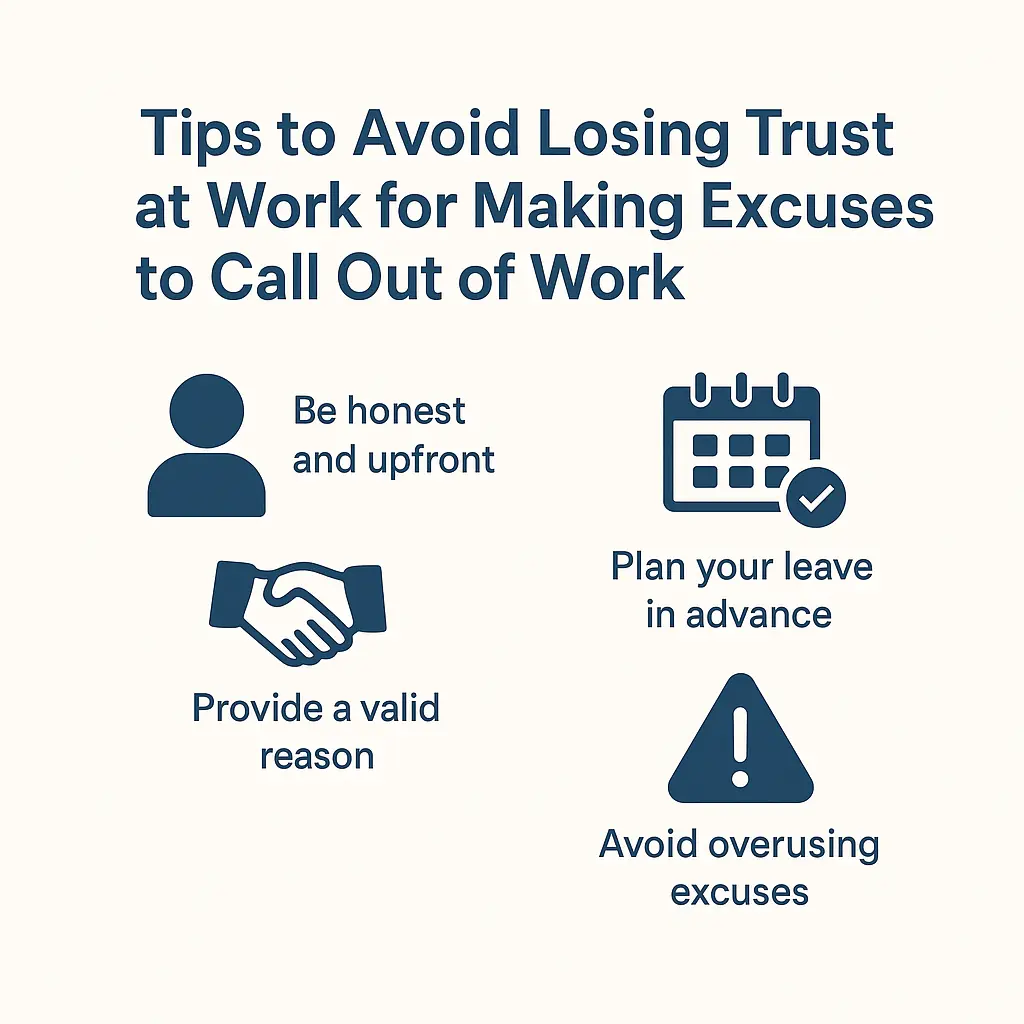
Quick List: 15 Good Excuses to Call Off Work
Here’s a quick, clean list you can refer to. These are widely accepted and don’t raise too many questions:
These aren’t just random ideas—they’re based on real situations people face often. As long as you’re honest, and communicate clearly, these reasons usually hold up well in most workplaces.
Conclusion
Taking time off work doesn’t make you unreliable—it makes you human. Life throws things at everyone, and sometimes, stepping away is the most responsible choice. The key lies in how you communicate that need. Good excuses to call out of work are grounded in reality and delivered with respect. They don’t need to be dramatic or deeply personal. Just clear, honest, and timely.
Use the right reason, speak to the right person, and keep your message short but solid. That’s how you maintain trust while taking care of what matters most—your health, your family, and your responsibilities.

About the Author
Jonathan Savage is a leadership strategist who helps teams boost performance through clarity and structure. At SmartSuccessGuide.com, he shares proven frameworks for building focused, high-performing teams that deliver real results.



